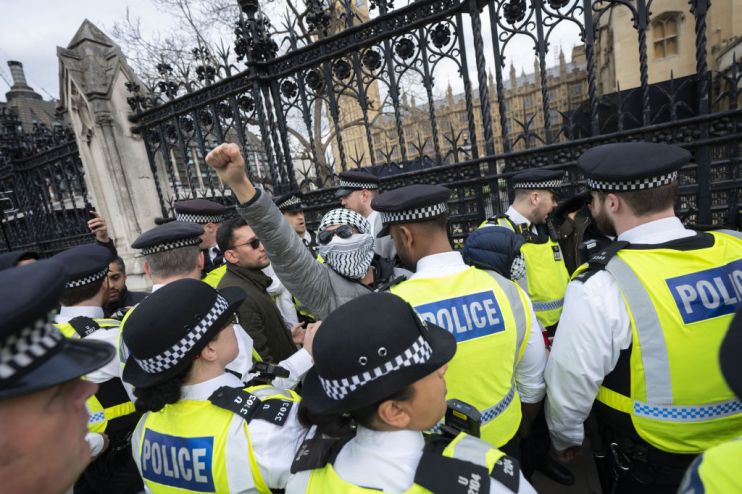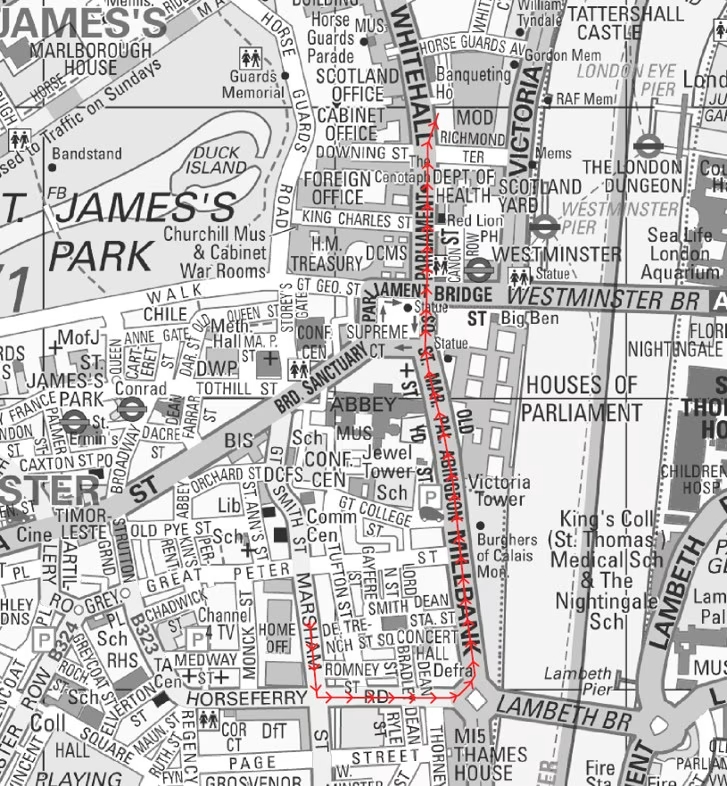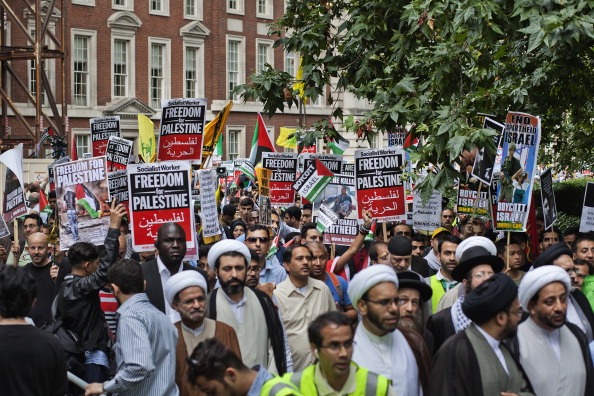Al Quds Day march: Over 500 Met Police officers for Palestine demo amid Gaza tensions

The Metropolitan Police has set out its plan for today’s pro-Palestine Al Quds Day march through central London, with hundreds of officers involved.
In a statement ahead of the protest starting at 3pm, which is expected to have thousands of people attending, the force said 500 officers at least would be used.
Outlining the policing plan, the Met said: “We will be distributing leaflets clearly setting out what is acceptable and what is not so that there can be no doubt about what constitutes a criminal offence.”
This comes after the Home Office called on the police to implement a “zero tolerance” policy to criminality, including support for proscribed terror groups Hamas and Hezbollah.
What is the Al Quds Day march?
The yearly event originated in Iran and sees rallies held internationally to express support for Palestine and profess opposition to Israel and Zionism.
It is organised by the Islamic Human Rights Commission.
Demonstrators will join the march from the Home Office in central London at 3pm before proceeding to Downing Street to mark the last Friday of Ramadan.
It comes amid international outrage over the deaths of seven aid workers in Gaza as the Israel-Hamas conflict reaches six months following the October 7 massacre in Israel.
British Jewish organisations have described the event as promoting “anti-Israel hate” and an “Iranian-backed hate fest” and urged that anyone flying proscribed flags be arrested.
In previous years, flags of terror groups Hizballah and Hamas have been flown during the Al Quds march, but these organisations have now been banned in the UK.
Who is protesting, where can they go?
The Met said that there are two protests taking place.
The main Al Quds Day march will take a number of hours along a designated route, while a static protest will also take place outside Parliament, from counter-marchers, supportive of Israel.

The march will assemble outside the Home Office in Marsham Street from 3pm, before heading into Horseferry Road, along Millbank, past the front of the Houses of Parliament and finishing in Whitehall where speeches will take place.
The second demonstration will take the form of a static protest in Parliament Square.
Police said they have imposed conditions under the Public Order Act on both demonstrations, and anyone participating in the Al Quds Day march must stick to the pre-agreed route.
It released a map with the agreed route in red, with anyone straying risking arrest.
This comes after almost six months of weekly protests in support of the Palestinian cause, amid the ongoing war in Gaza.
The war began after Hamas, which runs the territory, launched an attack on 7 October killing 1,300 Israelis and taking more than 120 hostage. Many are still in captivity.
More than 30,000 Palestinians have been killed by Israel since October, with aid workers also in the firing line. Seven were killed this week, including three Britons, leading to calls from across the political spectrum, for UK arms sales to be suspended to Israel.
Free speech vs Hate speech
Because previous years have included the flying of terror flags, before they were banned; calls have grown for the march to be banned.
Jewish groups have in particular accused marchers of using antisemitic imagery and language.
A spokesperson for the Community Security Trust (CST), which campaigns against antisemitism, said it is an “event inspired by the government of Iran, with all the extremism and antisemitism that entails”.
The spokesperson added: “It is a march predicated on anti-Israel hate, expressed through calls for Israel to be erased from the map, and in the past regularly featured Hizbollah flags until that terror group was banned.”
“That gives an indication of the nature of this event and we can expect similar kinds of extremism this year.”
A Board of Deputies (BoD) spokesperson said: “Given the recent dramatic upsurge in antisemitism, we would urge the police to ensure that proscribed flags are not used and that hate is not promoted in this parade, and that any offenders are arrested and prosecuted.”

A Home Office spokesperson said: “Antisemitism has no place in this country, nor has any form of racism, and the support that has been shown for Hizballah at the annual Al Quds march in London in previous years has been unacceptable.
“Intimidating, threatening or causing disruption to the law-abiding majority must not be tolerated” adding that “we are backing our police with new powers to tackle criminality at protests, including mask wearing to conceal identities.
We expect the police to take a zero-tolerance approach to any law breaking.
The Home Office
The mayor of London Sadiq Khan also urged demonstrators to be “lawful, peaceful and safe”, and that “even if you’re not breaking the law, you should be cognizant and aware of the consequences” of actions.
The Met sought to reassure that it has the protest under control, with commander Colin Wingrove, who is leading the policing operation, saying: “We recognise that there will be some who feel this march should not be allowed to take place at all.
“We work to the law. Parliament has determined that there are only very rare and specific circumstances when an application can be made to the Home Secretary for a protest to be banned.
“It requires a real risk of serious disorder and neither the intelligence picture nor the conversations we have had with organisers give us reason to believe that threshold will be met today.
The rights of people to express their views through protest must be protected and our officers will ensure they are, but anyone who abuses those rights and uses them as an opportunity to commit offences or to promote hate can expect to face police action.
Commander Colin Wingrove
“We have set out our expectations clearly in discussions with the organisers of both demonstrations. We expect them to manage their events and we expect participants to remain within the law. If they do not, officers will act positively to intervene, to investigate and to deal with allegations.”
In weekly protests over Gaza, there have been numerous arrests, including protesters wearing stickers on their clothes depicting paragliders, which Hamas used on 7 October.
Commander Colin Wingrove continued: “There have been a number of instances at protests in recent months where actions have taken place that are distasteful to many, but that don’t cross the line into criminality.
“Our role is to police without fear or favour right up to the line of the law, but our powers do not extend to policing taste and decency, no matter our view of what is being said.
“Where that line into criminality is crossed, we will step in. Anyone seen to be supporting a proscribed group, using hate speech, trying to directly interfere with the other protest or committing other offences will be dealt with by officers.”
